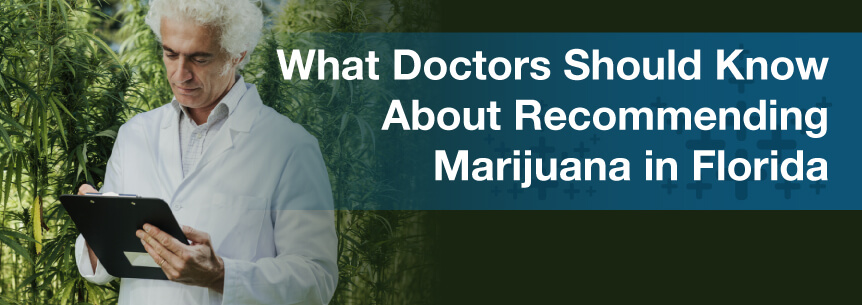
Medical marijuana became legal in Florida on November 8, 2016, when the majority of voters approved Florida’s medical marijuana legalization initiative. Although patients, dispensaries and physicians are obligated to follow certain rules and regulations, eligible Florida residents can now enjoy the health benefits of medical marijuana treatment. Similarly, registered physicians can appeal to more patients and have new opportunities to treat severe conditions.
Unfortunately, there is a shortage of registered physicians in Florida. As of May 2018, there are 114,878 patients in the Medical Marijuana Use Registry (MMUR), and only 1,404 qualified physicians in the state of Florida. Over two-thousand more currently have applications in processing. With only 13 approved medical marijuana treatment centers and 37 approved dispensaries, the demand for medical marijuana professionals is high.
If you are a licensed physician in the state of Florida, your knowledge and experience are needed in the newfound world of legal medical marijuana treatment. To become a registered marijuana doctor, you need to complete a few steps. The process is not too difficult, and it should not take long before you can begin recommending marijuana in Florida.
We’ll explain the process according to the law so you’ll know how to recommend medical marijuana to qualified patients with confidence. Let this be your doctor’s guide to medical cannabis in the Sunshine State.
According to Section 381.986 of the 2018 Florida Statutes, marijuana is defined as all parts of the cannabis plant including the seeds, resin, mixtures and preparations. Registered patients must purchase marijuana from an approved medical marijuana treatment center (MMTC).
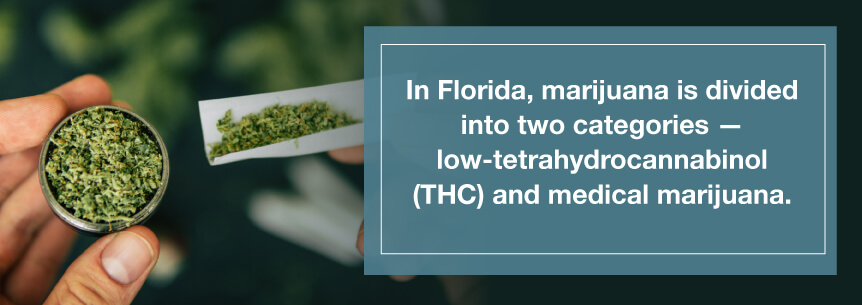
In Florida, marijuana is divided into two categories — low-tetrahydrocannabinol (THC) and medical marijuana. Low-THC cannabis contains less THC, resulting in mild effects and does not create a euphoric high. A physician might recommend low-THC cannabis for a pregnant patient, for example.
Medical marijuana, on the other hand, contains higher levels of THC and can create psychoactive effects. Both types of marijuana products are currently available at MMTCs to help patients with symptom relief.
Medical use refers to obtaining, possessing, using, delivering or administering marijuana under Florida law. In the state of Florida, the medical use of medical marijuana and low-THC cannabis does not include:
Smoking is not a healthy way to ingest medical marijuana. Accepted forms of medical marijuana include:
When you become a registered physician, patients will ask what device they can legally use to administer their medication. Patients cannot use any device they wish. They need to obtain a medical marijuana delivery device from the MMTC they visit. A medical marijuana delivery device includes any object used to prepare, store, ingest or inhale medical cannabis, and is dispensed at the MMTC of choice.
You may be wondering what the certification process entails. When you become a registered physician, you treat your patients just as you would your other patients. The greatest difference is you will have to determine that a debilitating condition exists before registering your patient in the MMUR. In general, here is what to expect as a registered physician:
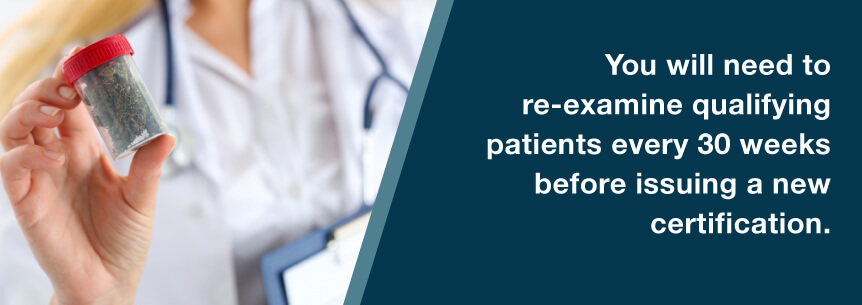
Some patients may have already asked you if you are a medical marijuana doctor. Patients want medical cannabis treatment and registered physicians have the chance to provide the best care possible.
Physicians may hesitate to incorporate medical marijuana into their treatment plans for fear of legal risks. Fortunately, the legal risks are minimal. As long as a physician issues a certification with reasonable care to a qualifying patient, they shall not be subject to criminal or civil liabilities under Florida law. You must still continue to meet the standard of care as a qualified physician.
Nevertheless, doctors need to be aware of the prohibitions and expect new laws to change and evolve. Current potential penalties include:
You may also be subject to criminal penalties under Chapter 893, Drug Abuse Prevention and Control.
Part of the certification process involves reviewing your patient’s history with drug abuse to help you determine if medical marijuana treatment is the best option.
If you are already a licensed physician in Florida, the registration process is simple. Here are the requirements for becoming a registered physician:
The Florida Physician Medical Marijuana Course:
Course objectives include:
If you are concerned about legal risks but have an interest in treating patients with medical marijuana, you can rest assured — your coursework will provide the foundation you need to issue certifications legally.
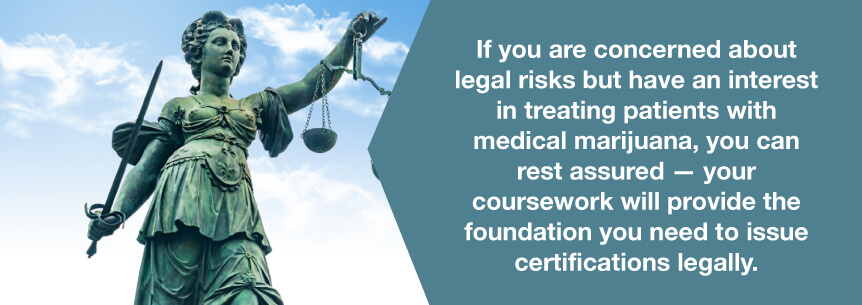
Not all physicians are eligible to become registered. The following circumstances prohibit a physician’s eligibility in Florida:
Certification is your authorization for a patient to receive medical marijuana treatment for their qualifying condition. As a registered physician, you may only certify a patient if you:
Once you determine your patient will benefit from medical marijuana, you will take the following steps to certify your patient:
You will need to enter the following content into the registry:
How do you know if a patient is qualified for treatment? First, they must be either a resident of Florida or a seasonal resident. A seasonal resident means they reside in Florida for at least 31 consecutive days each year and maintain a temporary residence in Florida.
Next, they must have a severe medical condition as defined by Section 29 of the Florida Constitution including:
You can place no more than three orders for a max of 70 days per order, and afterward, you must issue a new certificate.
Before a patient or caregiver can visit an MMTC, they need to complete the registration process correctly. To register, patients must:
After you enter a patient into the MMUR, you will provide your patient with a patient ID number. They need this number to apply for their registry identification card.
Patients and caregivers will then apply for their registration identification cards by completing either an electronic or paper application. Once their identification cards have been approved, they can contact an MMTC to fill an order. Even if a patient does not have an MMTC in their home city, they can still contact an MMTC and arrange a delivery. Currently, the approved MMTCs are:
Your patient may require the assistance of a caregiver to help monitor and administer their medical marijuana. In Florida, a caregiver is defined as a person who has agreed to assist a qualified patient’s use of medical marijuana. A caregiver must:
Caregivers may not:
To receive a registry identification card, patients and caregivers must:
The application processing time is 30 days from receipt. Patients and caregivers show their cards at MMTCs to obtain medical marijuana.
A Florida marijuana card will keep your patients out of jail while possessing medical marijuana. However, it is important they understand the rules and regulations. They need to know that even with a card it is illegal to drive under the influence of medical marijuana. With a marijuana card, patients will enjoy:
In general, as a registered physician you can:
You cannot:
If you have doubts about the effectiveness of medical marijuana treatment, you still may want to consider offering treatment options for your patients. Patients are demanding cannabis treatment to cope with severe pain. With an open mind, you can attract new patients to your practice and retain regular patients with additional services. Patients will turn to you as a source they can trust, rather than seek relief from less credible entities or obtain marijuana illegally.
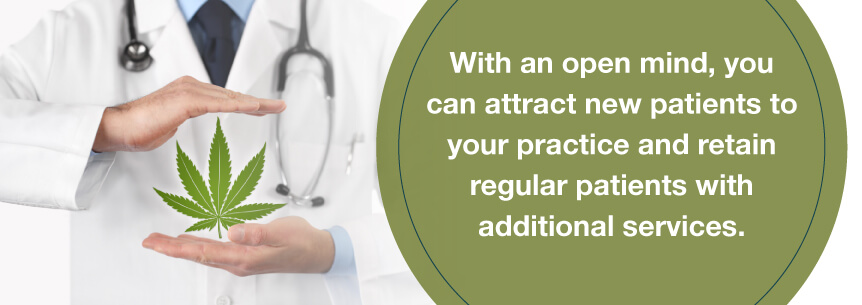
If you are ready to join the growing and exciting field of medical cannabis, let us be your go-to source for the latest information and to connect you with patients. Every day, thousands of patients search for registered physicians in their state. Our site connects doctors to patients who are seeking help.
If you register with us, you’ll enjoy greater exposure and draw more patients to your practice. We notify you of patients’ appointment requests securely and conveniently in your email inbox.
Ready to get started? Register with us with today.
No Information on MarijuanaDoctors.Com should be used to diagnose, treat, prevent or cure any disease or condition. You can view our Full Disclaimer here.